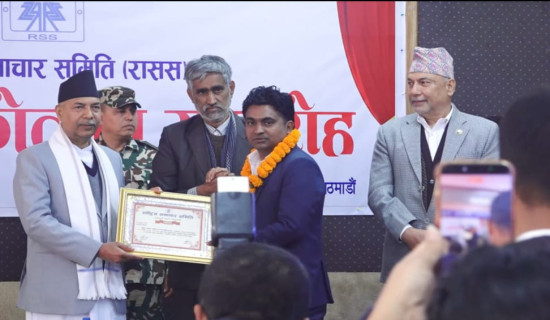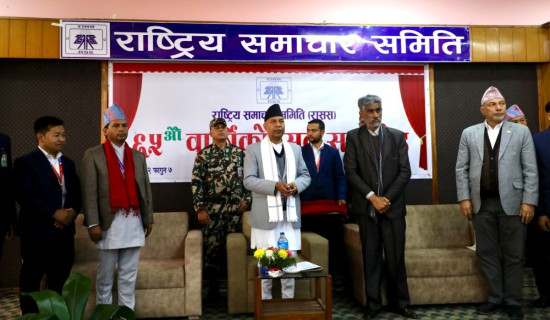- Friday, 20 February 2026
Make Use Of Organic Pesticides
With the excessive use of chemical pesticides in vegetables and fruits, consumers in Nepal have continued to remain at high risk of facing various health hazards. As the domestic production of these daily consumer items is not sufficient to meet the rising internal demand, the country imports a lot of vegetables, fruits and other goods from India, China and other countries. Since there are no adequate labs across the country to test chemical contamination in foods, consumers are forced to consume pesticide-laced products.
The level of awareness among general consumers about the harmful effects of such items on their health seems to have been quite low. They also hardly have any options because of the increasing usage of pesticides. Even farmers are not fully conscious about the unimaginable health risks posed to themselves and consumers alike by these products. Public health experts warn that people are likely to undergo numerous chronic health complications, including various forms of killer diseases, including cancer, if they consume chemically contaminated items. What is more tormenting is that every kitchen, especially in urban areas, is turning into a ‘poison storage’.
Chemical contamination
Media reports have shown that different species of vegetables with chemical contamination exceeding safe limits were recently found in markets within the Kathmandu Valley. According to reports, lab tests on round chilli samples from Makawanpur had nearly 58 per cent organophosphate pesticides. That amount is regarded as an alarmingly unsafe level. Vegetables having less than 35 per cent residues are safe for humans to consume. People can consume those items having pesticides between 35 and 45 per cent only after completing a waiting period (1-2 days). Green pumpkin samples from Makawanpur, sponge gourd from Dhading and cucumber from Kathmandu were also found unsafe for consumption because they contained excessive levels of organophosphate pesticides that are more poisonous than carbonates.
In Nepal, chemical adulteration is not a new phenomenon. With the detection of chemical contamination in vegetables and fruits, consumer rights campaigners have raised this issue time and again over the past many years. Despite this, the problem appears to have been aggravated due to a lack of desired measures in place. However, various responsible bodies under the Ministry of Agriculture and Livestock Development have been working to deal with the problem of undue use of pesticides in vegetables, fruits and other crops. But, their efforts have remained insufficient to address this burning issue, with more farmers opting for using such menacing chemicals.
Each year, the country imports about 1.6-1.7 million kgs of chemical pesticides. This speaks volumes about the growing use of those harmful chemicals in crops throughout the country. Pesticide testing facilities are available only in about one dozen federal markets, including the Kalimati Fruits and Vegetables Market. About 15-20 species of vegetable samples from this wholesale market are tested daily. The laboratories now test samples of imported vegetables and fruits as well regularly as they may also be highly contaminated chemically. This is a praiseworthy effort. But it is not adequate considering the many different species of vegetables and fruits that are brought daily there to sell. There is an urgent need for the government to set up labs in additional areas to help ensure a supply of safer and healthier items nationwide.
Government bodies are often blamed for not being so serious about controlling and regulating the use of pesticides. The local governments are responsible for regulating pesticides and providing farmers with the necessary technical assistance to boost production. But one of the impediments is that the local levels hardly possess sufficient technical human resources. The political leadership is often found allocating inadequate financial resources for the agriculture sector. Because indigenous seeds are disappearing from the country, there is a growing tendency among farmers to use imported seeds. Such seeds rarely give better yields without using pesticides. So, governments must work towards protecting and promoting indigenous varieties of seed and encouraging farmers to use organic pesticides in place of chemical ones. Farmers should be inspired to harvest crops after having maintained the pre-harvest interval with the use of chemical pesticides.
Attention
With demand for pesticides and seeds on the rise in farming areas, agrovets are often found supplying such items there. One of the factors behind the increasing trend among farmers to use pesticides is that the local profit-monger agrovets wrongly ask farmers to maximise the usage of such chemicals in their crops. The three-tier governments, farmers, consumers, and other stakeholders must make concerted efforts to minimise the use of chemical pesticides in farms. Those chemicals not only take a toll on human health but also cause damage to the quality of soil, crops, and the environment as a whole.
Educating the general public about the possible health hazards of the consumption of chemical contaminated items is necessary. The three-tier governments must focus their immediate attention on it. When consumers are fully aware about the risks of the contaminated products, they will avoid such items. This forces farmers either to go for organic farming or the rational use of chemical pesticides. It is imperative to revamp the production system itself to produce consumable items. As agriculture is an important sector of the national economy, governments must accord high priority to it. With a lot of arable land, the country holds huge potential for increasing organic products to be self-reliant in food. We can also export surplus products abroad to make foreign exchange.
(The author is a former deputy executive editor of this daily.)

















